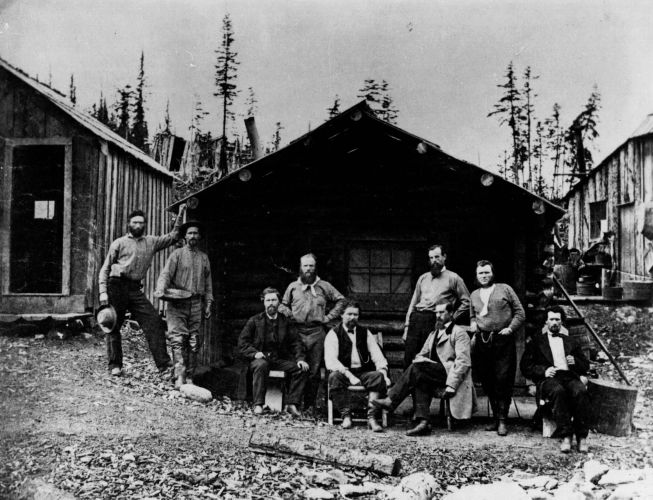WILLIAM's CREEK, 1865:
B.C.'S FIRST CHESS TOURNAMENT
The following letter to the editor of the Victoria newspaper The Daily British Colonist was published on March 18, 1865:
Williams Creek, 18th February 1865
To the editor of the British Colonist
Sir,
It may not be uninteresting to your readers, at least that portion of them who are chess players, to receive an account of a chess tournament which lately took place among the players on the creek.
A public notice was put up by some of the most enthusiastic players that a meeting for the purpose of getting up a chess tournament would be held on the 10th ult. [i.e., January 10] At this meeting twelve gentlemen gave in their names as competitors for the championship. It was decided that the players should be divided into pairs by ballot, to play five games, and the first three games won by either of the contestants to decide between them; the winners of these first games to be again paired off to play a like number of games, and so continue to pair off until only one winner remained, who should be declared the champion of the tournament.
Accordingly the players in the first ballot were as follows:
J.A. Fraser vs. D. McNaughton
J. Elliott vs. B. Bellenbur
Jas. T. Steele vs. W. Reynbow
W. Dodd vs. E. Hodgens
J.S. Thompson vs. J. McLaren
[the sixth pairing, presumably involving John Adair, is missing from the report]
Second Ballot
J.A. Fraser vs. John Elliot [sic]
John Adair vs. James T. Steele
Edward Hodgens vs. J.S. Thompson
Third Ballot
The players were now reduced to three, Messrs. Thompson, Fraser and Steele. On drawing for partners the lot fell upon Messrs. Thompson and Fraser to play together and the winner to play Mr. Steele. In this match Mr. Fraser was again the winner. This gentleman had now played three matches without losing a single game, and his friends felt confident that he would come out the victor in the next, but his opponent Mr. Steele proved a tough customer, and after playing five well contested games, they stood two each the fifth one having been a drawn one; then came the deciding game of which I annex a copy, which was won in good style by Mr. Steele, who was accordingly declared the champion of the tournament.
I am, yours, &c.
A Chess Player

Heron claim miners, 1867; the gentleman third from the left is John Adair
Image (A-03819) courtesy of the Royal BC Museum and Archives
Williams Creek was the focus of the Cariboo gold rush of the 1860s. Inundated with miners and other individuals hoping to make a fortune, the creek acquired several towns almost overnight, including Marysville, Cameronton, Richfield, and the best known, Barkerville, which claimed (falsely) to be the largest city west of Chicago and north of San Francisco. At its height, Barkerville and environs had a population of some ten thousand; by comparison, Victoria's population at the beginning of the gold rush was substantially less than a thousand.
Although written in the third person, one assumes the above letter was penned by one of the players, or at least someone who was close enough to the tournament to have access to the final game score. Other less detailed newspaper accounts have minor discrepencies, most notably in stating that the tournament started with sixteen rather than twelve players, adding the additional names Kenton, Spencer, Phillips, and Trevellyan. The format, a series of knockout matches, had been standard since London 1851, and was only gradually supplanted by the round robin in the coming decade. Sixteen players would be ideal for such a format, but the other accounts also acknowledge there were three participants in the third ballot, so either there were only twelve players as stated, or some of the winners dropped out along the way.
The first library in Williams Creek had opened in Cameronton in 1864, so it seems likely the event was publicized via the library. With a series of four stages spread over exactly one month (the letter specifies that the printed final game was played on February 10) and up to five games in each stage, one imagines the miners playing their individual matches in the space of a week, a game or two here or there as they had an evening free or a day off from the hardships of pioneer life.
And what of the players? There is no way of knowing for certain if they are the same persons, but there is a J. McLaren and J.A. Fraser buried in the Barkersville cemetery. John McLaren was a grammar school headmaster before coming to the Cariboo in 1864; for a time he edited the local newspaper, the Cariboo Sentinel. He was killed at age thirty-one by a slide of sand and tailings in 1869. John Alexander Fraser was the fourth son of explorer Simon Fraser; he came to Cameronton in 1864 as an engineer. Money woes over his family's mortgaged farm and an unhappy love affair led him to commit suicide on May 20, 1865 - he was thirty-two. The next day one of the companies he had invested heavily in struck a rich lead. John Adair is identified in the above photograph. A James Steele worked for John Cameron's company, and can be identified in a photo of the latter. There was also a Steele Claim on the creek, said to be the richest piece of ground in the area; in 1861 it was producing thirty to forty pounds of gold a day.